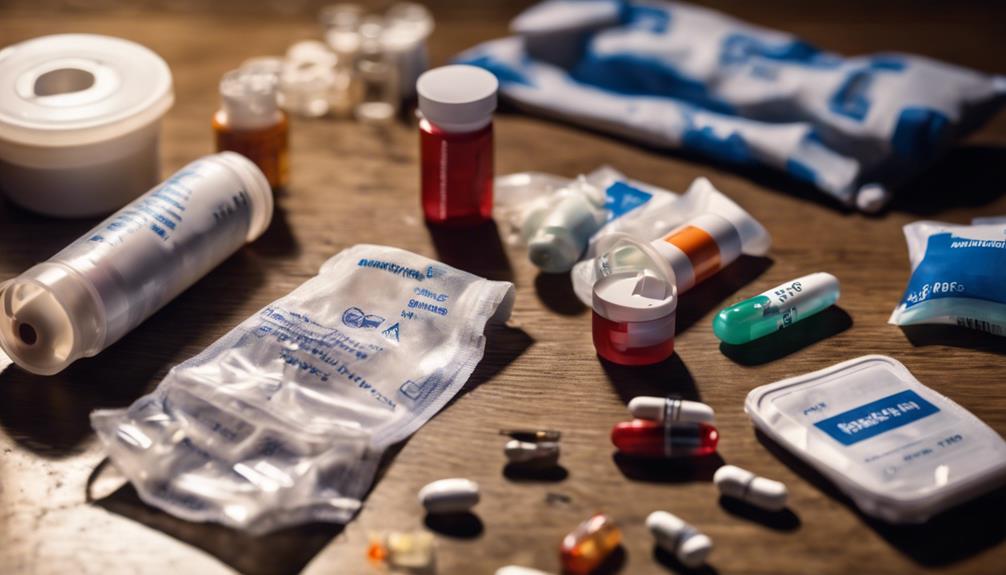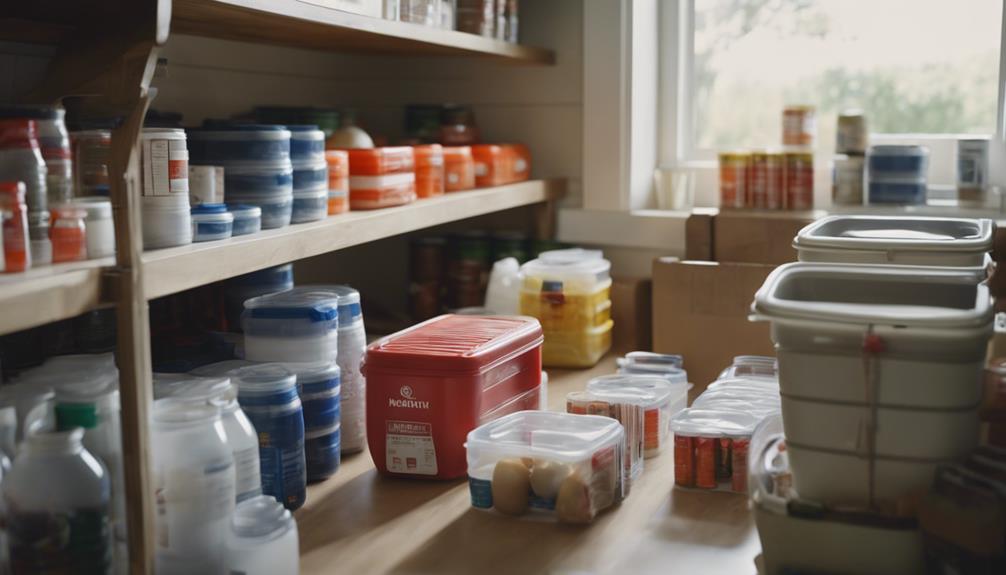When prepping your medical kit, include essential antibiotics like Amoxicillin Clavulanate, Ciprofloxacin, and Doxycycline to combat bacterial infections effectively. These medications are trusted choices for preppers due to their broad-spectrum efficacy against common pathogens. They play a vital role in infection management and are indispensable in emergency medical supplies. Make sure to have these antibiotics ready to handle a variety of bacterial threats. Additional details on important medications and supplies can further enhance your emergency preparedness kit.
Key Takeaways
- Amoxicillin Clavulanate, Ciprofloxacin, and Doxycycline are crucial for broad-spectrum bacterial infection coverage.
- Antiseptic wipes and topical antibiotic ointment aid in wound care and infection prevention.
- Loperamide is essential for managing diarrhea and preventing dehydration in emergency situations.
- Gauze, bandages, and pain relievers like Ibuprofen and Acetaminophen are vital for wound care and pain management.
- Include a thermometer and tweezers in your medical kit for monitoring health and safely removing foreign objects.
Broad-Spectrum Antibiotics
Including broad-spectrum antibiotics like Amoxicillin Clavulanate, Ciprofloxacin, and Doxycycline in your emergency medical supplies is essential for preparing against a wide range of bacterial infections. These medications are vital components of any prepper's kit, offering versatility in combating various bacterial illnesses.
Broad-spectrum antibiotics play a significant role in infection management, as they target a wide array of bacteria, ensuring thorough treatment. By having these antibiotics readily available in your emergency kit, you're safeguarding your health and readiness to address potential bacterial infections effectively.
Amoxicillin Clavulanate, Ciprofloxacin, and Doxycycline are trusted choices for preppers due to their effectiveness against common bacterial pathogens. When it comes to emergency preparedness, these broad-spectrum antibiotics are indispensable tools in maintaining your medical well-being. Make sure to include them in your emergency supplies to be well-equipped to handle bacterial infections during challenging times.
Antiseptic Wipes

To enhance your emergency medical supplies beyond broad-spectrum antibiotics, consider the importance of including antiseptic wipes for effective wound care and infection prevention.
Antiseptic wipes play an essential role in reducing infection risks by thoroughly cleaning wounds and inhibiting bacterial growth. These wipes contain antiseptic agents like alcohol or benzalkonium chloride, which disinfect the skin and help prevent complications from injuries.
Convenient for on-the-go use, antiseptic wipes offer quick and easy wound cleansing, ensuring proper wound care in emergency situations. Regular use of antiseptic wipes can greatly decrease the likelihood of wound infections, promoting faster healing and reducing the chances of further health issues.
Pain Relievers

Pain relievers are essential additions to your emergency antibiotics kit, offering relief from discomfort and fever.
Non-prescription analgesics like Ibuprofen play an important role in managing inflammation, headaches, and minor aches efficiently during emergencies.
Including over-the-counter pain relief guarantees you can address various conditions promptly, promoting comfort and aiding in a quicker recovery.
Over-The-Counter Pain Relief
Make sure your emergency antibiotics kit includes essential over-the-counter pain relievers like Ibuprofen and Acetaminophen for immediate relief during unforeseen situations. These medications are crucial for managing discomfort, reducing inflammation, and lowering fever levels.
Ibuprofen is effective for mild to moderate pain relief, while Acetaminophen is commonly used to reduce fevers. Including these pain relievers in your emergency kit guarantees you're prepared for various medical needs that may arise unexpectedly. Remember to adhere to proper dosage instructions and usage guidelines to ensure the safe and effective relief these medications provide.
Non-Prescription Analgesics
When faced with sudden discomfort or minor pain during emergencies, it's essential to have non-prescription analgesics like ibuprofen and acetaminophen in your emergency kit.
Ibuprofen is effective for reducing inflammation and managing mild to moderate pain, making it an excellent choice for various injuries.
On the other hand, acetaminophen is popular for its fever-reducing properties and ability to relieve minor aches and pains, providing much-needed relief in emergency situations.
Including these pain relievers in your emergency kit can greatly enhance your comfort and well-being during crises.
Whether it's a headache, muscle pain, or fever, having these non-prescription analgesics readily available ensures that you can address discomfort effectively when access to medical care may be limited.
Managing Discomfort Efficiently
To efficiently manage discomfort during emergencies, incorporating pain relievers into your emergency antibiotics kit is essential for ensuring prompt relief and improved well-being. Pain relievers play an important role in managing pain, inflammation, and fever effectively in emergency situations.
By including these medications in your kit, you enhance your readiness to address various medical issues promptly. Remember, proper dosage and administration of pain relievers are crucial for ensuring their effectiveness during emergencies.
For instance, medications like ibuprofen can provide relief from aches, pains, and fevers, ultimately enhancing comfort and aiding in the recovery process. Being prepared with pain relievers not only alleviates discomfort but also supports your overall well-being in times of crisis.
Make sure to familiarize yourself with the appropriate use of these medications to maximize their benefits and effectively manage any discomfort that may arise.
Topical Antibiotic Ointment

Consider including a topical antibiotic ointment like Mupirocin in your emergency kit for effective skin infection prevention and treatment. These ointments are essential for managing wounds, cuts, and burns, preventing bacterial growth, and promoting healing. Mupirocin specifically targets common culprits like Staphylococcus aureus and Streptococcus pyogenes, providing targeted treatment for these infections. By working directly on the skin's surface, topical antibiotics reduce the risk of systemic side effects, making them ideal for first aid scenarios.
Here is a table summarizing the key points about the importance of including a topical antibiotic ointment in your prepper kit:
| Key Points | Topical Antibiotic Ointments Benefits |
|---|---|
| Effective Wound Care | Prevents and treats skin infections |
| Targeted Treatment | Combats Staphylococcus aureus and Streptococcus pyogenes infections |
| Promotes Healing | Aids in the healing process of burns, cuts, and wounds |
| Prevents Bacterial Growth | Reduces the risk of bacterial growth on injured skin |
Gauze & Bandages

Including an adequate amount of gauze and bandages in your emergency antibiotics kit is vital for effective wound care and dressing during emergencies.
Gauze pads are highly absorbent and versatile, making them perfect for various wound sizes and types. They play an important role in controlling bleeding, preventing infections, and promoting healing.
Bandages are equally important as they secure dressings in place and provide support for injured areas during recovery. By having gauze and bandages on hand, you guarantee proper wound management, reducing the risk of complications in critical situations.
Remember, these supplies are essential for addressing injuries promptly and effectively. Make sure to stock up on a variety of gauze and bandage sizes to cater to different wound needs.
In emergencies, quick access to these materials can make a significant difference in the outcome of your wound care efforts and overall recovery.
Allergy Medication

Make sure you include essential allergy medication in your emergency antibiotics kit to effectively manage allergic reactions during critical situations.
Allergy medication, such as antihistamines like Benadryl or Claritin, plays an important role in alleviating symptoms such as itching, hives, swelling, and even difficulty breathing that can arise from allergies. These medications are particularly essential for treating severe allergic reactions known as anaphylaxis, which can be triggered by insect stings, certain foods, or medications.
By having allergy medication readily available in your emergency kit, you guarantee thorough care for various medical emergencies that may involve allergic reactions. Remember to check the expiration dates on these medications regularly and replace them as needed to maintain their effectiveness in managing allergic symptoms.
Including allergy medication alongside your antibiotics and other supplies equips you to handle a wider range of health concerns in emergency situations.
Anti-diarrheal Medication

When facing diarrhea, anti-diarrheal medication like Loperamide can be your go-to solution, slowing down bowel movements and providing relief.
Dehydration and electrolyte imbalances can result from diarrhea, making it essential to have anti-diarrheal medication in your emergency kit.
Understanding common causes of diarrhea, such as bacterial infections and food poisoning, underscores the importance of including this medication in your preparedness supplies.
Dehydration Prevention Tips
To prevent dehydration, consider incorporating anti-diarrheal medication like Loperamide into your emergency preparedness supplies. Dehydration is a significant risk associated with excessive bowel movements caused by gastrointestinal issues.
Anti-diarrheal medications such as Loperamide work by slowing down intestinal movement, reducing water loss, and helping control diarrhea. During emergencies, when access to clean water may be limited, managing diarrhea effectively is vital for preventing dehydration.
Dehydration can disrupt the body's electrolyte balance, leading to further complications. By including anti-diarrheal medication in your emergency kit, you can better handle gastrointestinal issues and decrease the risk of dehydration.
Remember that maintaining proper hydration alongside using anti-diarrheal medication is essential for preventing dehydration and promoting overall health. Be prepared by having these medications on hand to address diarrhea promptly and mitigate the potential water loss that can occur during emergencies.
Common Causes Identified
Dehydration risks from excessive bowel movements during emergencies can be effectively addressed by understanding the common causes identified for the need of anti-diarrheal medication like Loperamide.
In emergency kits, anti-diarrheal medications play an essential role in managing gastrointestinal issues that can arise unexpectedly. Diarrhea, if left untreated, can lead to dehydration and electrolyte imbalance, making these medications vital for maintaining hydration levels.
Infections, contaminated water sources, and stress are common triggers for gastrointestinal disturbances, emphasizing the significance of having anti-diarrheal medication in your emergency preparedness supplies.
By slowing down bowel movements, anti-diarrheal medications provide relief from uncomfortable diarrhea symptoms, allowing you to focus on staying healthy during uncertain situations.
Including these medications in your emergency kit can help you address gastrointestinal issues promptly, ensuring you're better prepared to tackle any challenges that may come your way.
Stay proactive and prioritize your health by being equipped with the necessary tools to handle gastrointestinal concerns effectively.
Thermometer

Having a thermometer on hand is vital for monitoring body temperature and detecting signs of infection or illness. A thermometer helps you track changes in body temperature, particularly the presence of a fever, which can indicate underlying infections that might require antibiotics for treatment.
Digital thermometers are preferred for their accuracy and ease of use, making them practical for emergency situations. By regularly monitoring your temperature, you can catch fevers early, prompting timely medical attention and appropriate healthcare decisions.
It's essential to have a thermometer in your prepper kit to stay proactive in managing potential health issues. Remember, a fever is often the body's way of signaling that something might be wrong, so being equipped with a reliable thermometer is a simple yet effective way to stay ahead of any developing illnesses.
Tweezers

Make sure your prepper antibiotics kit includes tweezers as they're indispensable for safely removing foreign objects from wounds and skin.
In emergency situations, having tweezers at hand can aid in effective wound care by allowing you to swiftly remove debris, splinters, or ticks that could lead to infections if left untreated.
The precision offered by quality tweezers with a fine tip ensures that you can extract embedded objects with accuracy, minimizing the risk of complications.
Whether it's a minor injury or skin irritation, having tweezers in your kit enables you to address these issues promptly and hygienically.
Remember that when it comes to debris removal or handling splinters, the use of tweezers is essential for ensuring proper care and preventing further damage.
Quick Reference Guide

Developing a Quick Reference Guide is vital for preppers to efficiently access essential medication information in emergency situations. This guide provides a concise overview of essential medications for your emergency kits, aiding in proper antibiotic selection and administration. In critical situations, quick information on managing infections and injuries effectively can make a significant difference. This valuable resource ensures preppers are well-prepared with the right antibiotics when facing medical challenges.
| Antibiotic Name | Dosage | Common Uses |
|---|---|---|
| Amoxicillin | 500mg every 8 hours | Respiratory infections |
| Ciprofloxacin | 500mg twice daily | Skin and soft tissue infections |
| Doxycycline | 100mg twice daily | Tick-borne illnesses |
| Clindamycin | 300mg every 6 hours | Dental infections |
Frequently Asked Questions
Can Expired Antibiotics Still Be Used in an Emergency?
Yes, expired antibiotics can still be used in an emergency situation. While their potency may decrease over time, they can still provide some level of effectiveness. However, it's always best to consult a healthcare professional if possible.
Are There Any Natural Alternatives to Antiseptic Wipes?
When you're in a pinch, nature's got your back with alternatives to antiseptic wipes. Try tea tree oil for its cleansing properties or aloe vera for soothing relief. Keep your kit natural and effective!
How Should Pain Relievers Be Stored in a Prepper's Kit?
Keep pain relievers in your prepper's kit in a cool, dry place away from direct sunlight. Store them in their original containers with childproof caps to guarantee safety. Check expiration dates regularly for effectiveness.
Can Topical Antibiotic Ointments Be Used on Pets?
Yes, topical antibiotic ointments can be used on pets for minor cuts or scrapes. Make sure to consult with a veterinarian for proper guidance on applying these medications to your furry friends to guarantee their safety and well-being.
Are There Any Specific Guidelines for Using a Thermometer in Emergencies?
In emergencies, make sure to use a thermometer properly by following guidelines for accurate readings. Avoid sharing thermometers between individuals to prevent the spread of germs. Always clean and disinfect the thermometer after each use.
Conclusion
In times of crisis, having preppers antibiotics in your kit can be a lifesaver. These essential medications provide a vital line of defense against infections and illnesses, ensuring you can stay healthy and strong when resources are scarce. It’s crucial to choose antibiotics that are broad-spectrum and can treat a variety of bacterial infections. Adding antibiotics for your prepper kit ensures that you’re prepared to handle unexpected medical challenges, from minor wounds to more serious infections. However, it’s important to consult with a healthcare professional before stocking up to ensure proper use and dosage.
By including a variety of antibiotics, antiseptics, and other medications in your emergency supplies, you're preparing yourself for whatever challenges may come your way.
Stay prepared, stay safe, and stay informed.










